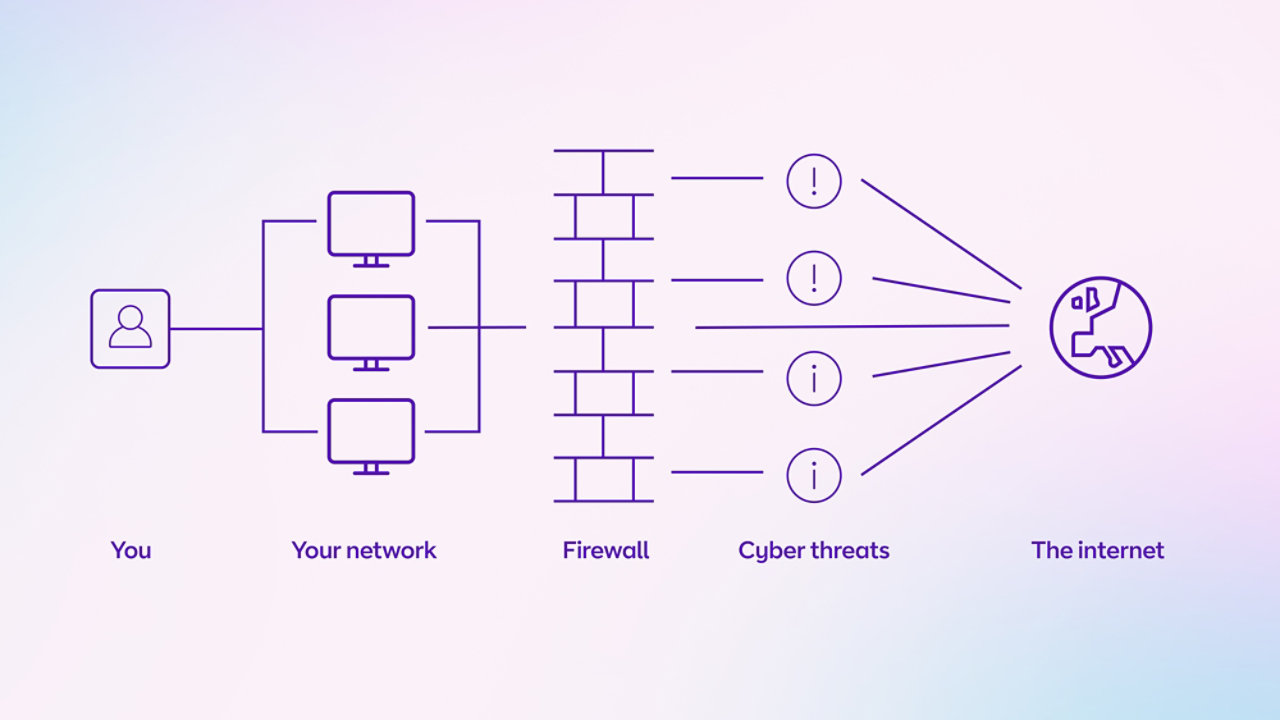What is a firewall and why does every business need one?
A firewall is vital for any small or medium-sized business. Acting as a digital security guard, it monitors and filters traffic to block threats like malware and unauthorised access.
This guide explains the meaning of a firewall, what it does, and why SMEs need firewall protection to safeguard data, devices, and operations.
What is a firewall?
Firewalls form a robust layer of digital security around your business.
The technical definition of a firewall is a network security device or system. They allow or deny entry to everything that comes their way, such as emails, website downloads or any other kind of digital traffic.
Think of them as a smart digital security guard at the gates of your premises. They follow the configured rules on what is allowed to pass through and who is allowed to talk to who.
Firewalls operate according to a predefined set of security rules and, quite simply, if something doesn’t conform to those rules, it won’t be allowed in or out.
That gives you a secure barrier between your trusted internal network (i.e. the systems you use within your business) and external networks that cannot be trusted, such as the internet.
What does a firewall do?
Firewalls work by inspecting data packets (the small units of data that information is broken into to allow it to travel rapidly across networks) and looking for anything that will alert it to danger.
This might be malware ‘signatures’, where a pattern of code matches something on a database of malicious software. Or it could spot credit card details or other sensitive items that are trying to leave the network, thus preventing data leaks.
Based on the information it gathers, the firewall will take one of three possible actions:
- Allow: where the traffic is permitted to pass.
- Deny: where the traffic is blocked.
- Log: an additional step where it will log certain activities, especially if traffic is denied – for example, who was trying to get in, where they came from and what time they were doing it.

What type of firewall does my business need?
You can choose from two different kinds of firewall for your business: either an embedded one, or a dedicated firewall.
Most business hubs, including the BT Business Hub, will include an embedded firewall as part of the package. And for 80% of small businesses, that should offer adequate protection against unwanted digital traffic entering or exiting your business.
You’ll only need to consider having a firewall instead if your business starts to grow and your security needs become more complex. As a general rule of thumb, that would be if you have more than three zones within the business that require a firewall.
Typically, it would then make sense to consider what’s known as a hardware firewall. This is a physical device that sits, literally, between your internet connection and your company network. It will generally be more powerful than other options and often include advanced features. On the other hand, it’s likely to be more expensive than an embedded option and require some expert set-up and management.
Configuring the firewall to protect your organisation is vital to defend your business.
Why every business needs a firewall
- Protection against unauthorised access.
- Virus protection: preventing malware from even entering the system.
- Data security: stopping important business and customer data being stolen or compromised.
Key takeaways
If you only remember three things, make them these:
- Firewalls can block or allow data entering and leaving your network, protecting your business from data breaches, malicious software and other digital threats.
- There are three types of firewalls: software, hardware and cloud based. Which is right for you will depend on your business.
- The benefits of a firewall include better data security, protection from malicious software.
Firewalls are essential in keeping your company properly protected from digital criminal activity that could lead to business disruption, financial losses and reputational damage.
Fortunately, installing one is relatively easy. It’s just a question of understanding what’s right for your business.


